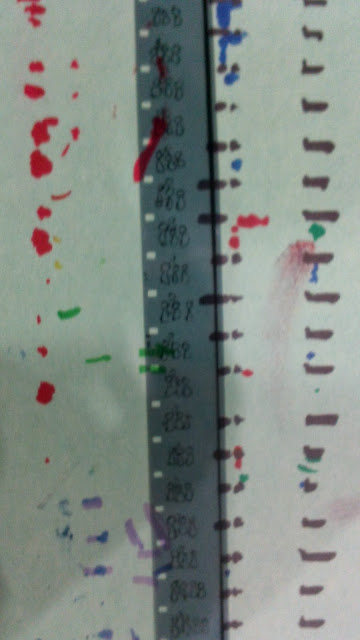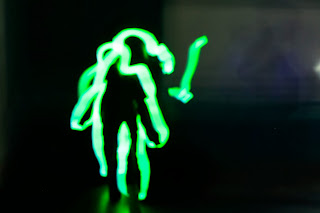Alberto Giacometti
About Me
Blog Archive
-
▼
2013
(54)
-
▼
September
(16)
- Life Drawing: 2B pencil
- Scratch film
- Dolphinholme Trip: What I want to do
- Sam Taylor-Wood
- Drawing with light
- Visual Communication 2:2
- Screen printing
- The Caravan Gallery
- Visual Communication 1:1
- 3D - Spot welding
- Textiles 2:2
- Fine art 2:2
- Textiles 1:2
- Fine Art 1:2
- Museum and Art Gallery
- Introduction
-
▼
September
(16)
Thursday, 26 September 2013
Life Drawing: 2B pencil
Tonight I attended my first evening life drawing class. Although I knew what to expect, I didn't fully know what I was going to be drawing and this made me nervous. After a few minutes of drawing our model I suddenly felt at ease and I enjoyed it greatly. Richard - the fine art tutor - reminded us to concentrate on the body as a whole not just one section at a time. Doing that can alter the proportion and the image is can become distorted or detached. I made the mistake of not properly measuring the model's legs which resulted in the drawing not being proportional. Over time I will become more confident in the measuring. Tonight I used a 2B pencil, I am looking forward to the next lesson as I can't wait to gain more skills and try it in lots of different mediums.
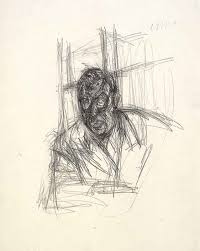


Scratch film
Learning about how people used to achieve moving image was interesting. There was no camera and no play/pause button just film and a projector. We had 5 seconds each to create something with. 25 frames made 1 second. It felt tedious repeating frames and drawing in such a tiny space however the outcome was great. As a group our work collaborated together to make series of imagery. There are lots of colours and although there isn't a story it is still interesting to see what people have done. The soundtrack is original audio sound from the 1960's which gives the film a some narrative.
scratch film from Lily Mullan on Vimeo.
My part is from 2:32 to 2:38
It is linking back to the thoughts I've been having about society. The invention of moving image was first created to document life at the time. The 'Everyone does nothing' text I had in the film expresses the fact that, today, everyone simply does nothing. Things like calling up about wages that haven't cleared properly or my phone contract that I was promised I would get a 10% discount on. All of which results in us going round and round in circles, each person passing me onto someone else because everyone does nothing. There are too many people in society today to account for therefore we are simply just numbers. Nothing is personal or one-to-one anymore, people don't have the time. There is too much to do and not enough time to just stop and think about how we got to where we are now. At first there was one person and the population on the film accumulates to show the problem we are facing today.
scratch film from Lily Mullan on Vimeo.
My part is from 2:32 to 2:38
It is linking back to the thoughts I've been having about society. The invention of moving image was first created to document life at the time. The 'Everyone does nothing' text I had in the film expresses the fact that, today, everyone simply does nothing. Things like calling up about wages that haven't cleared properly or my phone contract that I was promised I would get a 10% discount on. All of which results in us going round and round in circles, each person passing me onto someone else because everyone does nothing. There are too many people in society today to account for therefore we are simply just numbers. Nothing is personal or one-to-one anymore, people don't have the time. There is too much to do and not enough time to just stop and think about how we got to where we are now. At first there was one person and the population on the film accumulates to show the problem we are facing today.
Wednesday, 25 September 2013
Dolphinholme Trip: What I want to do
On Tuesday 1st October we are going to Dolphinholme in Lancashire. We will be staying overnight in a yurt on a farm. It excites me that I will be able to experiment with the natural surroundings I will have around me. I am looking forward to doing observational drawing and trying out different techniques. I have researched numerous artists such as John Virtue, Anselm Kiefer, Andy Goldsworthy, Richard Long and Michael Andrews - all of whom respond to landscape in different ways. I will be drawing, painting, collaging and photographing. I can also experiment with 3D and make things from what I find foraging around the area which I would then proceed to capture photographs of.
There will also be a musical artist playing. I can tune into the lyrics and the emotion which I will enjoy illustrating onto paper.
Overall, I am looking forward to this trip. I will be focussing on art all day around nature and all of the forms it chooses to present me. The weather and the lighting will influence the ideas and the ability of what I am going to do. I am positive that I will get the most out of this experience.
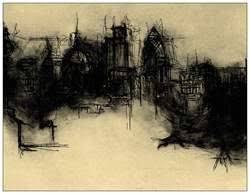




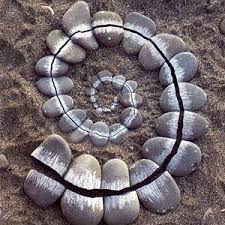





There will also be a musical artist playing. I can tune into the lyrics and the emotion which I will enjoy illustrating onto paper.
Overall, I am looking forward to this trip. I will be focussing on art all day around nature and all of the forms it chooses to present me. The weather and the lighting will influence the ideas and the ability of what I am going to do. I am positive that I will get the most out of this experience.
John Virtue
John Virtue likes creates his art purely monochrome. I like that his drawings are polluted and unclear. He uses charcoal, ink and watercolour to create these images. I will enjoy using this techniqueAnselm Kiefer
Anselm Kiefer sculpts and creates art using materials such as straw, ash, flowers, paint and many other things that he finds. His work is very influential and I can refer back to his images when looking for inspiration around the area. I am looking forward to this.
Andy Goldsworthy
Andy Goldsworthy carefully sculpts objects from the area in which he is to create pristine abstract images that are focussed around spirals and spherical shapes.
Richard Long
Like Goldsworthy, Richard Long similarly sculpts and creates land art. What makes him different is how he presents his work in studios. They are very accurate and clean. This contrasts to Goldsworthy whom approaches a very natural feel to his work.
Michael Andrews
I love the use of water colour in Andrews' paintings. They give a fantastical interpretation on landscapes. I enjoy using watercolour as it is my preferred medium however I am making sure my mind is open for other mediums of art like the previous artists I have researched.
Sam Taylor-Wood
This has influenced me hugely and has taught me that things can progress to something you could never expect at the start. Art is used as an expression regardless of how it is projected and this has taught me that people need to remember that.
| This is the short film exhibited at the White Cube in London showing an argument between two people. It stresses the importance of personal space and how easily it can become obstructed. www.whitecube.com/exhibitions/samtaylorwood |
Tuesday, 24 September 2013
Drawing with light
In our photography lesson we worked in groups on drawing with light. I learnt how to adjust
the settings on the camera to change the shutter speed. Because the
speed of the shutter has been made so it takes more time to capture an
image, when light is moved around, it captures every movement and it
makes a picture.
We had the idea for me to stand still whilst my other group members moved lights around my body and someone captured the photo. The outcome was an abstract vision of a silhouette of the human form. Thinking about the human form, we thought to focus closer to the face. Because one of our group members wore glasses, we found that the light reflected from them and it worked really well.
We experimented with drawing pictures and writing texts however the drawings I tried weren't very clear. Learning from our mistakes, we gained the knowledge that any slight movement of the camera can alter the image and cause it to lack focus. Sometimes this can turn into an accidental masterpiece where it actually works really well and sometimes it doesn't look great at all. I learnt that the strength of light determines the outcome of the photograph massively as well as how condensed it is. If there is a big area of light (such as a phone screen) then the result is quite a soft and wide light trail. However if the light is controlled (like a torch) the trail is a great deal more precise and easier to control. To understand, I compared it to the different between a brush and a pen - A thick brush has more area for the paint to fill more space whereas the pen is a lot more controlled and allows you to add attention to detail on a smaller scale.
Overall, this experience was extremely fun and experimental. I have been wanting to try this technique out for a very long time and I'm happy I finally understand how to achieve it. I found it quite difficult to create photographs from artists such as Brian Hart. However, like him, I used the body and objects to allow me to become influenced. Although aren't as detailed and precise, they are still effective.
 |
| You can see the difference between the phone screen and the torch |
 |
| My attempt at drawing the simple character I made between the text in my welding piece! |
 |
| Successful accident |
 |
| A group member modelled also and we shone colourful lights around her. This would have of been more successful in complete darkness |
 |
| The outcome of drawing on the floor with light |
 |
| This was achieved by following the light around coat hooks |
 |
| Both the light on the wall and the floor give huge depth to this image |
 |
| This is how we learnt that too much light creates a very alternate image |
 | ||
| The accidental blur of this portrait is a good effect |
 |
| We experimented with shadow |
Brian Hart
Subscribe to:
Comments (Atom)





